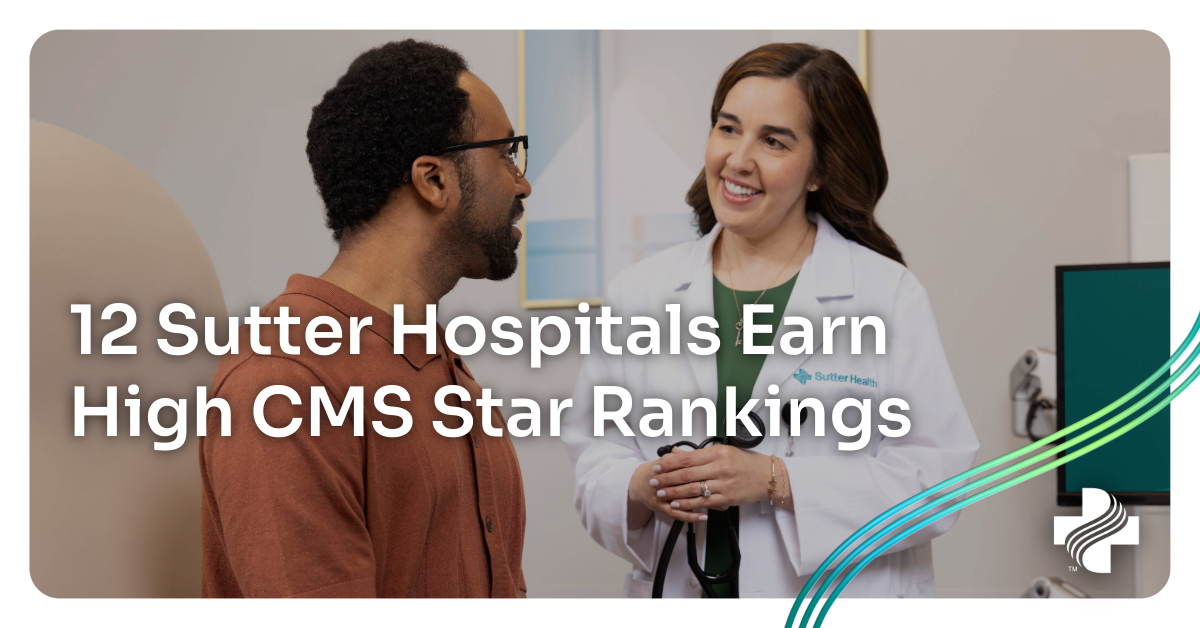When choosing where to receive care, today’s consumers have hundreds of options. They read reviews, compare ratings and look for hospitals recognized by trusted sources. Sometimes, a single extra star can be the deciding factor.
This year, four Sutter hospitals earned the highest possible five-star rating for overall hospital quality from the Centers for Medicare & Medicaid Services. An additional eight Sutter hospitals received four stars. These ratings reflect Sutter’s ongoing commitment to delivering high-quality, safe care for all.
“The team at Sutter Health, from bedside caregivers to behind-the-scenes staff, work together every day to make our hospitals and care centers the top choice for patients,” said Krista Lopes, Sutter’s vice president for quality and patient safety. “When patients walk through our doors, they can expect better outcomes, safer care, faster healing and higher satisfaction.”
Only 10% of hospitals nationwide received a five-star rating. Sutter’s top performing hospitals include:
- Sutter’s Alta Bates Summit Medical Center – Summit Campus (upgrade from four stars in 2024)
- Sutter Lakeside Hospital
- Sutter’s Mills-Peninsula Medical Center (five stars for seven consecutive years)
- Sutter’s Novato Community Hospital (five stars for five consecutive years)
Several Sutter hospitals also earned five-star recognition in individual quality measures, including cleanliness, and low rates of Clostridioides difficile, central line associated bloodstream infections and catheter associated urinary tract infections, that contribute to the overall CMS rating. Eight Sutter locations ranked among the top recommended hospitals in California based on patient surveys.
Sutter’s Four-Star Hospitals
- Sutter Amador Hospital
- Sutter Auburn Faith Hospital
- Sutter’s CPMC – Mission Bernal Campus
- Sutter Davis Hospital
- Sutter’s Eden Medical Center
- Sutter Medical Center, Sacramento
- Sutter Santa Rosa Regional Hospital
- Sutter Tracy Community Hospital
Behind the Stars: How Sutter Delivers Excellence
Sutter’s high CMS scores are the result of systemwide efforts to build a culture of continuous improvement in patient care:
- Consistent Communication: Standardizing nursing bundles, rounding communications and bedside shift reports improve consistency and transparency — so shift changes are seamless.
- Smarter Documentation: New AI tools have saved clinicians and physicians over 1 million hours, freeing up more time for patient care, and improving the clarity and usefulness of clinical notes in after-visit summaries, and easier scheduling.
- Strong Clinical Leadership: A dyad leadership model across advanced clinical service lines enhances collaboration, spreads best practices and gives more patients access to groundbreaking research and clinical trials.
CMS ratings are based on publicly reported data across key quality areas: readmission rates, timeliness and effectiveness of care, mortality, hospital-acquired infections and patient feedback.
To learn more about the CMS methodology, visit Care Compare.





